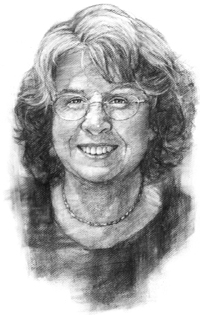The Rockefeller dean’s long journey to a pulpit
of her own
Illustration by Allan Burch

Name: Elizabeth Davenport
Title: Dean of Rockefeller Memorial Chapel
Degrees: AB, AM (theology), Oxford University; ThM (intercultural studies), Fuller Theological Seminary; PhD (religion and social ethics), University of Southern California
Previous posts: Senior associate dean of religious life, assistant dean of student affairs, and Episcopal chaplain at the University of Southern California, where she also taught at the Keck School of Medicine, focusing on ethics and cultural competence in medical practice; associate priest at St. John’s Episcopal Cathedral in Los Angeles.
No ordinary ordination: I spent the first part of my young-adult life moving sideways, exploring different religious contexts but without a clear sense of a career path because [as a woman in the Anglican Church at that time] I couldn’t fully be ordained. I was ordained to the diaconate in England when I was 26 and to the priesthood in Los Angeles when I was 35. Normally there would be a six-month interval between these two ceremonies. In my case, I had to wait a decade and move halfway around the world.
From USC to the U of C: The University of Chicago is simply a place where I wanted to work. The more I got to know it, the more I got to know my potential future colleagues, it felt like a fit all the way around. I sometimes compare [that feeling] to my youth spent at Oxford. Not that Chicago and Oxford are the same place, but there are certain, significant resemblances much cherished by this university: the mixture of physical architecture, which, here as at Oxford, goes from the ancient to the ultra modern; the ambience of the place; the seriousness of the academic mission; the rigor of study; the deep and passionate involvement of faculty in the life of the university and, indeed, of the city. So there was a sense of coming home.
Not a shy town: People show up for things here. Perhaps I’d gotten too used to a culture where students just go to the beach, but here you put on an event, and people come. It’s wonderful.
Founded on diversity: Rockefeller Chapel is intentionally a place structured for interreligious use, and that was true even when they were building it. They were conscious, even though they used the model of the cathedral, that people came from diverse religious traditions and backgrounds.
Building on that foundation: I have begun working with Muslim, Hindu, Buddhist, and other students to identify faculty or community members whom we can call upon—at the moment out of the goodness of their hearts, but hopefully in the future with some kind of funding—to serve those communities in the ways that the Jewish and Christian communities have historically been served.
Ministry and medicine: My grandfather, Sir Austin Bradford Hill, was the inventor of the randomized controlled trial, a major turning point in Western medicine. Among other things, he was the lead author of the first study that conclusively linked smoking and lung cancer, the so-called Hill/Doll Report of 1950. My father worked closely with my grandfather throughout his career. My mother was a physicist, and I simply decided I didn’t want to be a scientist. But when I came to do my PhD in social ethics, things came full circle. I began teaching in the Keck School of Medicine at USC, initially drawn in around issues such as the ways in which religious or spiritual orientation can help or hinder medical outcomes, finding that my family background gave me an interest in medical ethics. I’m continuing to work on a paper I began as a visiting scholar at Georgetown Medical School, which investigates some of my grandfather’s work in light of the issues raised for medicine today in transcultural contexts.
A pulpit of her own: I was seven years old when I said I was going to be a priest when I grew up. I asked for a pulpit for my eighth birthday. I finally have that pulpit. That is a very odd way to put it because I don’t own that pulpit, heavens. But I assign who preaches from that pulpit. In the past it’s always been someone else who assigned it and put me in there sometimes. So there is, and I say this with a sense of awe and humility, a huge sense of fulfillment for me personally in having not just a Christian pulpit, but a space where I can speak to the spiritual aspirations of a generation and to step into the shoes of my very illustrious predecessors. And that is scary. I don’t come to that lightly.
WRITE THE EDITOR
E-MAIL THIS ARTICLE
SHARE THIS ARTICLE
ALSO IN CHICAGO JOURNAL
RELATED LINKS
http://rockefeller.uchicago.edu/
